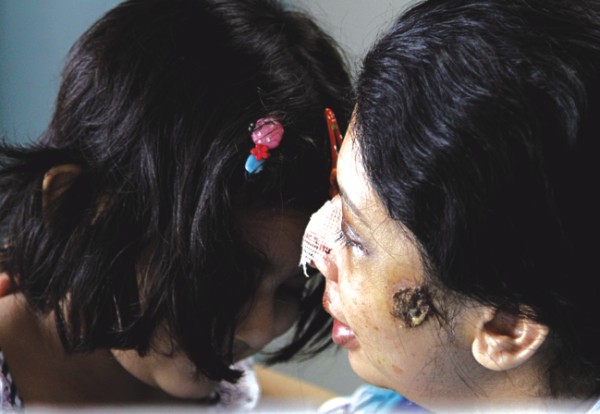
Inside
|
Rumanas, and Why they Stay
We are all accomplices to the violence carried out against women in our society, states HANA SHAMS AHMED.
When Zobaida Nasreen called me up to tell me what had happened to Rumana, I was on a busy street in Dhanmondi and I thought I had heard her wrong. I kept asking her to repeat. She must be talking about someone else, I thought.
But she wasn't.
It was Rumana Monzur Hema, one of my childhood friends with whom I had intermittent interactions after we grew up and finally reunited last year when her daughter was admitted to the same school as my son.
When I heard about what her husband did to her I was in disbelief and shock.
We had looked up to her as the girl who always came out either first or second in her class. She had come out First in her Masters finals from the International Relations department of Dhaka University and had started teaching right away. Last year she was elated when she won a scholarship to the University of British Columbia. She had been unsure whether to take her four-year-old daughter Anushe with her. In the end she decided to leave her daughter with her mother.
She never discussed what was going on between Sumon and her. He was a graduate engineer who was involved in some business, that's all we knew.
And that's why the brutality of the story along with the identity of the victim seemed overwhelmingly unbelievable.

Photo: SAMI SARKIS/GETTY IMAGES
Eyes gouged out. Nose bitten off. Lip bitten off. Dragged by the hair and attempted to be strangled. Saved by maids with an extra key to the room. Of course we presume that if a so-called 'emancipated' woman is threatened with abuse, she would have the support mechanism to walk out of that marriage, that she would not care what her family and relatives or those meddlesome people in our society say, that if she is financially independent she did not have to worry about her and her children's future.
All those assumptions and presumptions fell apart when we heard the sadistic brutality of what happened in Rumana's room on June 5, 2011.
I couldn't understand why someone like Rumana, with whom I had a discussion about Barbie dolls and feminism on her daughter's birthday last year, had put up with assaults from her own husband for so long. Now I look at those birthday photos and shiver when I see the face of Sumon behind his daughter and all the other children, knowing what was going on behind the scenes.
Then, as the media discussions spilled out into the open, I slowly began to realise why Rumana had still not left the monster that was her husband for so very long.
The reasons are visible on Facebook, on the blogs, in the distasteful innuendos poured out of the inks of journalists' pens, in the subject lines of emails filling up my inbox through various mailing lists and as mass spam to Rumana's Dhaka University colleagues.
The realisation surprisingly also came from what was said from between the lines of the 'character certificate statements' from her well-meaning friends from British Columbia, Canada.
Sumon's fraternity group
When the story first broke, the media reported the facts of the attack, the brutality and the family's reaction and her educational and family background. But as soon as Sumon 'briefed' the press about what he described as 'the torture done on him', some in the media turned around and started giving frustratingly large spaces to allegations made by Sumon about how he had been 'wronged'. And of course the Internet, apart from its milieu of advantages also provided an excellent platform, through Facebook, for the one too many insecure misogynists, very much like Sumon, to unleash their anger at the loss of control over 'their' women through a much-feared word called 'emancipation'.
Some bloggers aired their concern about how everyone was so 'one-sided' about the incident. There is a reason behind everything that takes place, someone said in an e-group. Can anyone honestly say that they have never done anything wrong in their lives, asked another commenter in a discussion group? Discussions revolved around how 'too much freedom' for women always ended up in such tragedies and that 'western dresses and attitudes' always caused problems for women. Women needed to maintain their 'modesty', some pointed out. And if they didn't, the men should not be blamed for going around on a rampage of harassment, acid attack, rape and domestic violence. Another spammer who claimed to know Rumana 'very well' sent a mass-mail to many university teachers complaining about some women teachers, mainly those who teach feminist studies, at the university, and threatened that “either the women-kind will preserve our values or we man-kind will start exercising our rights” and asked that “every man-kind should come forward and let Sayed talk openly”. The anonymous hate-mailer was trying to form a misogynists' solidarity group, a group that many men were openly happy to join.
The press conference where Rumana bravely faced the media to demand justice for herself and her family invited some members of this 'solidarity' group. One TV journalist walked off in a huff muttering, loudly enough for everyone to hear, that these kinds of incidents don't just occur out of the blue and there must be more to this. Another, whose appetite for gossip needed to be whet, asked Rumana what she had to say about the allegations of extra-marital affair made by her husband. That's right Mr Journalist -- it's so much more important to write about the gossip that make your papers sell than to write about a brutal crime that has blinded a woman forever.
The “good girl”, “pobitro bondhon” and why Rumanas really stay
And it was not only the misogynists but Rumana's well-meaning friends from British Columbia who sent a disturbing 'character certificate' about Rumana. Disturbing not because of what it said but because of what the underlying assumptions were. What it said was that they were extremely impressed with the way Rumana was leading her life in Canada, which included saying her prayers five times a day, eating halal food and opening the door with her head covered among other things. One friend said, “Rumana is a pious woman.” Another pointed out that she “was surrounded by her female friends all the time.” Another 'testified' on her “flawless reputation”.
So she was a wonderful person and did not 'deserve' to be attacked was the argument they were implicitly making.
But what if she had not been the embodiment of what some believe is 'good', would she then have 'deserved' to be tortured by her husband? Are women who deviate from the norm not deserving of the safety and security as a human being?
As long as we continue to use the 'good', 'pious' and 'modest' arguments to certify women, it will cripple them into staying in abusive relationships and marriages. As long as divorce remains a scandal-word, even 'emancipated' women like Rumana will hide from their family and friends what they are going through. As long as 'character certificates' are needed to debunk justification of attacks on women, we will only let the misogynists' fraternity group grow and defend their agenda, their so-called 'right' to control, injure and kill women.

Photo: SK ENAMUL HAQ
The 'holy' union that ends in blood
According to Ain O Salish Kendra, in the period of January to March 2011 there were already 104 reported cases of domestic violence throughout the country. There were 116 dowry-related attacks during this time (which included those perpetrated by husbands and/or in-laws), 18 acid attacks (some by close partners), and seven fatwa-related violence (some on the pretext of extra-marital affair by a woman). In 2010, out of the 397 cases of domestic violence, 225 women were killed by their husbands. Out of the 395 reported dowry-related violence cases, 224 were killed by their husbands and/or in-laws and 18 took their own lives after torture. Bangladesh ranks one of the highest in the world with respect to violence against women and, in terms of domestic violence, 50-70% of women in the country report being abused by their male partners.
The Domestic Violence (Resistance and Protection) Bill-2010 was passed recently but perhaps it's time to take a look at how its implementation is going to be ensured. Also, a more holistic approach needs to be taken to prevent domestic violence and all other violence against women. Laws are inadequate where the society plays such a big part in 'allowing' violence against women to take place until it's too late.
***
Rumana stayed because she was afraid of Sumon's revenge on her and her child.
She stayed because people would tell her to forgive Sumon, they would tell her that marriage was a pobitro bondhon ('holy union') and women had to sacrifice a lot of things to maintain that holy union.
She stayed because some people would not believe she was being physically abused.
She stayed because there had been so much gossip about divorced, single women, she did not want to be part of that gossip and bring 'shame' to her family.
She stayed because people would call her a 'bad mother' who did not think of the trauma to her child for being from a 'broken' home.
She stayed because Sumon would splatter the media with tall tales about her and with all parts of her body intact they would write about her to their hearts' content and bring her teaching career to 'shame' and become a source of gossip for her students.
It is not only Sumon, but all of us who are part of her social fabric that are accomplice to this and the thousands of other violence against women by their husbands and their families every day.
Hana Shams Ahmed is a member of Drishtipat Writers' Collective. She can be reached at hana@drishtipat.org